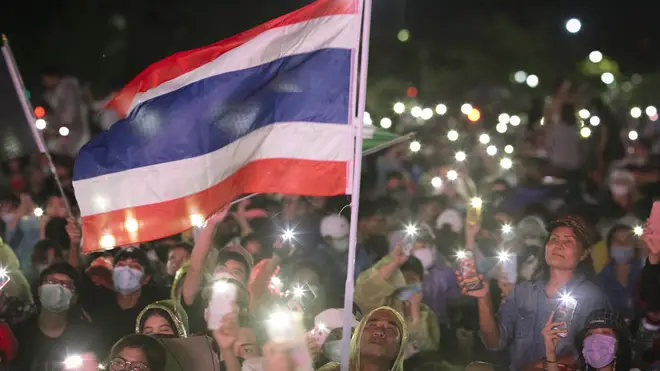
Tom Swarbrick 4pm - 6pm
19 September 2020, 20:24

Demonstrators occupied a historic field in Thailand’s capital to support the demands of a student-led protest movement for new elections.
Thousands of demonstrators have defied police warnings and occupied a historic field in Thailand’s capital to support the demands of a student-led protest movement for new elections and reform of the monarchy.
A fiery late-night speech with harsh criticisms of the royal institution set the crowd in Bangkok abuzz, as though the country has a harsh law that mandates a three to 15-year prison term for defaming the monarchy.
The speaker, Arnon Nampha, is a lawyer who broke the taboo on criticism of the monarchy at a small rally in early August with some mild questions about the institution.

He recalled on Saturday night how the crowd went silent on that occasion, and compared its reaction to the much more enthusiastic reception he was received for significantly more strident remarks.
The protesters, whose rally was continuing past midnight, have more activities planned for Sunday.
They have been purposely vague about a planned march, but Mr Arnon revealed in his speech that the protesters would lay down a plaque dedicated to the power of the people.
The action appears to be an implicit reference to the mysterious disappearance in 2017 of another decades-old bronze plaque that commemorated the 1932 revolution that turned Thailand — then known as Siam — from an absolute monarchy into a constitutional monarchy.

The crowd at Sanam Luang, a large field that has seen many historic events, were a disparate batch.
An LGBTQ contingent waved their iconic rainbow banners, while red flags sprouted across the area, representing Thailand’s Red Shirt political movement, which battled the country’s military in Bangkok’s streets 10 years ago.
Organisers had predicted that as many as 50,000 people would take part in the weekend’s protest.
Estimates of attendance at mass political events in Thailand are notoriously unreliable, but Saturday’s crowd appeared as big as any protest held at that venue in the past three decades.
Associated Press reporters estimated that around 20,000 people were present by early evening, while people were still arriving.
As the night progressed, there were skits, music and speakers on the stage. They touched on issues including the alleged incompetence of the government, corruption in the military and women’s rights.

The Grand Palace complex, a famous tourist destination whose golden highlights are dramatically lit at night, shone behind the side of the field opposite from the stage.
“The people who came here today came here peacefully and are really calling for democracy,” said Panupong Jadnok, one of the protest leaders.
At least 8,000 police officers reportedly were deployed for the event.
The core demands declared by the protesters in July were the dissolution of parliament with fresh elections, a new constitution and an end to intimidation of political activists. They have held a series of rallies since then.

They believe that Prime Minister Prayuth Chan-ocha, who as then-army commander led a 2014 coup toppling an elected government, was returned to power unfairly in last year’s general election because the laws had been changed to favour a pro-military party.
A constitution promulgated under military rule is likewise undemocratic, they charge.
The activists raised the stakes dramatically at an August 10 rally by issuing a 10-point manifesto calling for reforming the monarchy.
Their demands seek to limit the king’s powers, establish tighter controls on palace finances and allow open discussion of the monarchy. Their boldness was virtually unprecedented, as the monarchy is considered sacrosanct in Thailand.